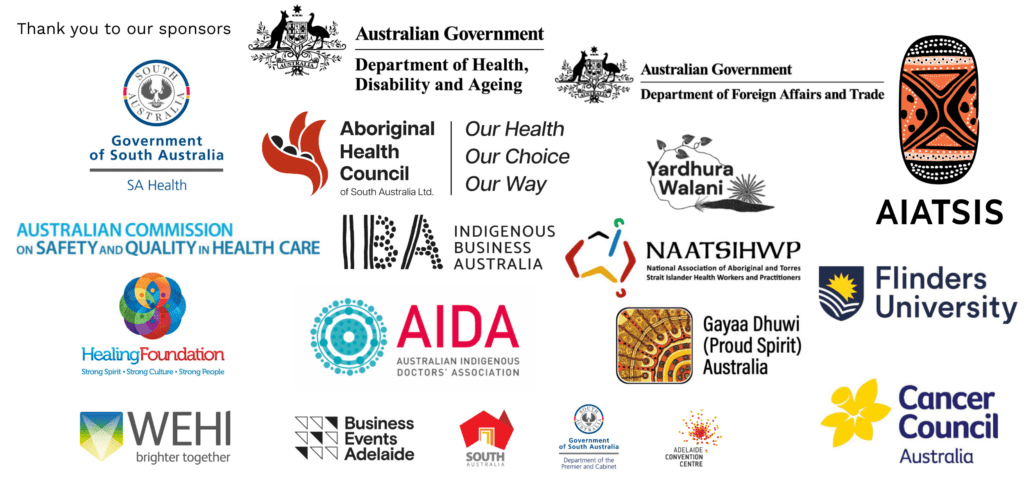Lowitja Institute celebrates Blak excellence in health research
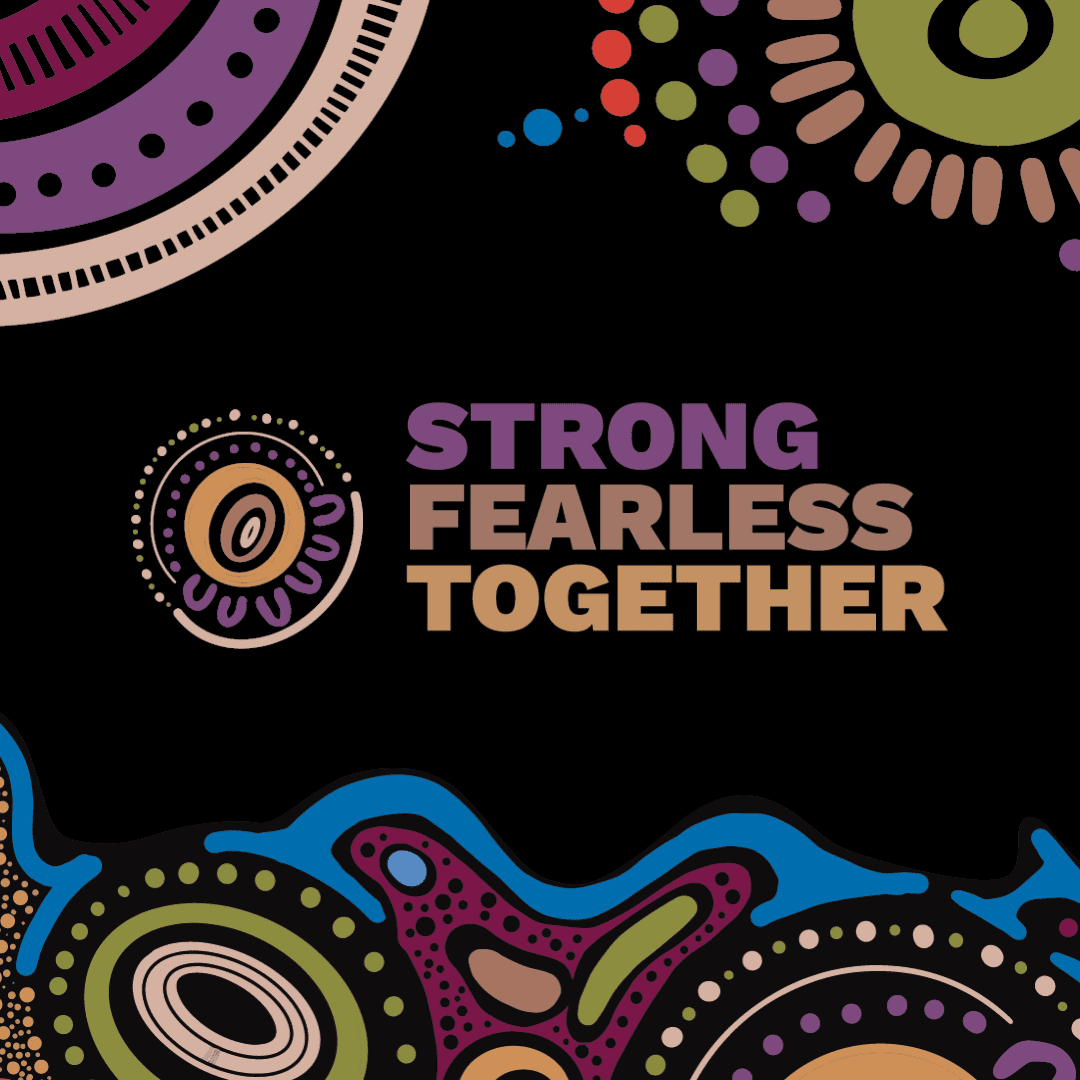
This week, Lowitja Institute presented its 2025 Lowitja Institute Awards during the 4th International Indigenous Health and Wellbeing Conference, on Kaurna Country, South Australia.
As Australia’s national community controlled health and wellbeing research institute, these awards recognise excellence in Aboriginal and Torres Strait Islander health and wellbeing research, community leadership, and innovation.
The awards were celebrated on Wednesday 18 June at a gala event, with entertainment from local Adelaide band Sound Factory and a surprise performance by special guest Yorta Yorta rapper, Briggs.
Lowitja Institute CEO Paul Stewart said, these awards showcase research that is culturally, ethically, and intellectually rigorous and for the benefit of Aboriginal and Torres Strait Islander peoples and communities.
‘Our Lowitja Institute Awards put a spotlight on Blak excellence in health research, and the outstanding contribution that our leaders and researchers make in improving the health and wellbeing of our peoples,’ Mr Stewart said.
‘Our award winners are leading examples of how Aboriginal-led research can achieve better outcomes that make a real difference in our communities.’
During the conference week, over 1,300 delegates engaged with renowned experts and leading voices in Indigenous health and wellbeing research from across Australia and internationally.
Congratulations to the following Lowitja Institute Award winners:
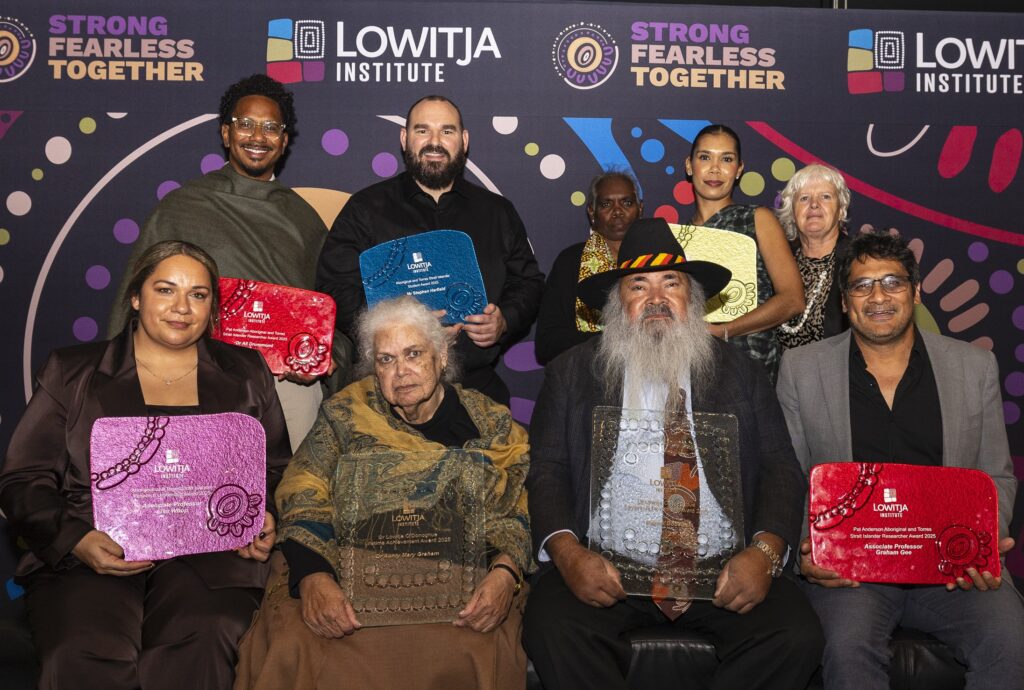
Bottom left to right: Associate Prof. Lisa Whop, Dr Aunty Mary Graham, Uncle Patrick Dodson, Associate Prof. Graham Gee.
Photography by Sia Duff
Lifetime Achievement Award
For outstanding and significant contribution to the health and wellbeing of Aboriginal and Torres Strait Islander peoples.
Dr Aunty Mary Graham
Adjunct Associate Professor Mary Graham is a Kombumerri and Wakka Wakka (wokka wokka) woman acknowledged as one of Australia’s leading Aboriginal philosophers and educators. Aunty Mary has spent more than four decades working across government, community organisations and universities. Aunty Mary has strong ties to the University of Queensland, lecturing on Aboriginal history, politics, and comparative philosophy. Aunty Mary played pivotal roles in establishing SNAICC – National Voice for Our Children, the Council for Aboriginal Reconciliation, and the Australian BlackCard cultural competency program. An accomplished writer and researcher, Aunty Mary co-founded Future Dreaming Australia to foster Indigenous and cross-cultural ecological knowledge.
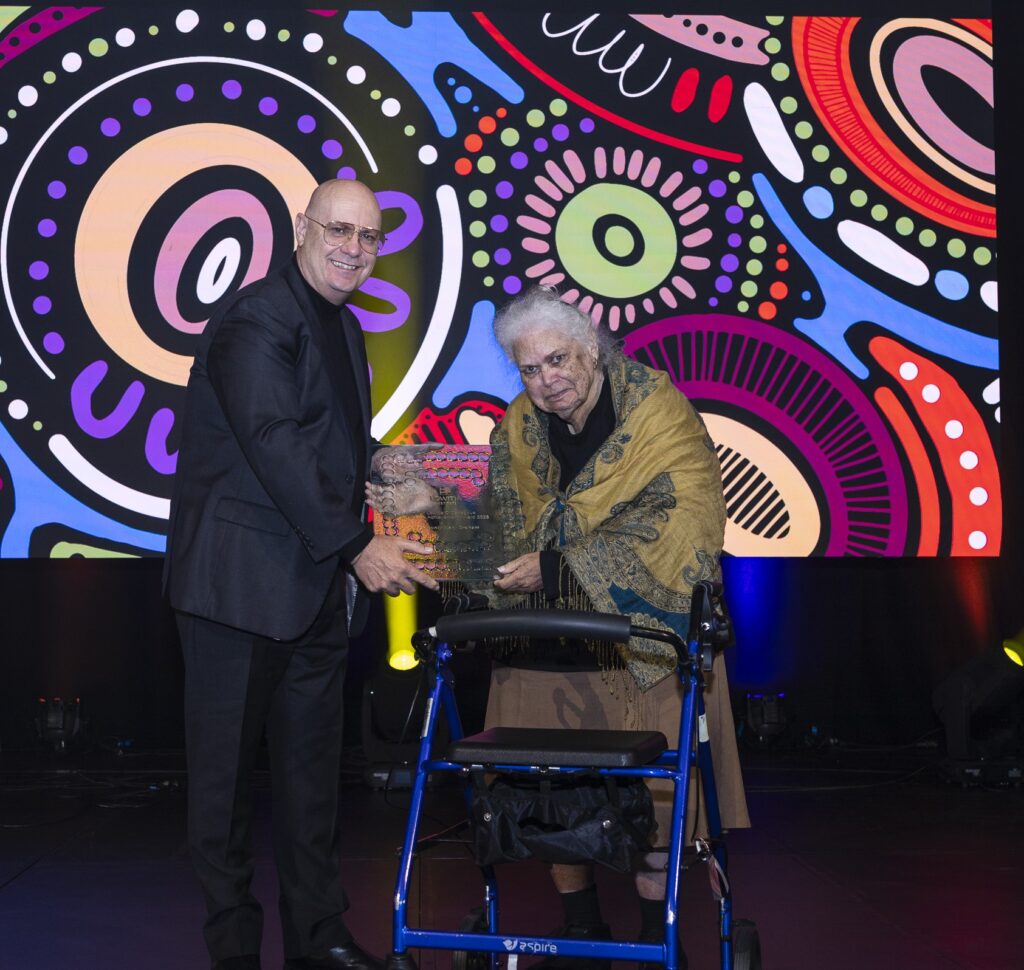
Uncle Patrick Dodson
Mr Patrick Dodson, a Yawuru Elder from Broome, is one of Australia’s most respected Indigenous leaders. Patrick’s public roles have seen him tirelessly advocating for the rights of Aboriginal and Torres Strait Islander peoples. As Central Land Council director in the 1980s, he successfully negotiated for Uluṟu-Kata Tjuṯa National Park’s return to Traditional Owners. As founding chair of the Council for Aboriginal Reconciliation in 1991, he earned the moniker ‘Father of Australian reconciliation’. Other roles have included Commissioner of the Royal Commission into Aboriginal Deaths in Custody, director of the Kimberley Land Council, and Western Australian Labor Senator between 2019 and 2024. At the forefront of Indigenous issues for more than 40 years, Patrick has a heart as big as his famed beard and a legacy that casts a longer shadow than his Akubra.
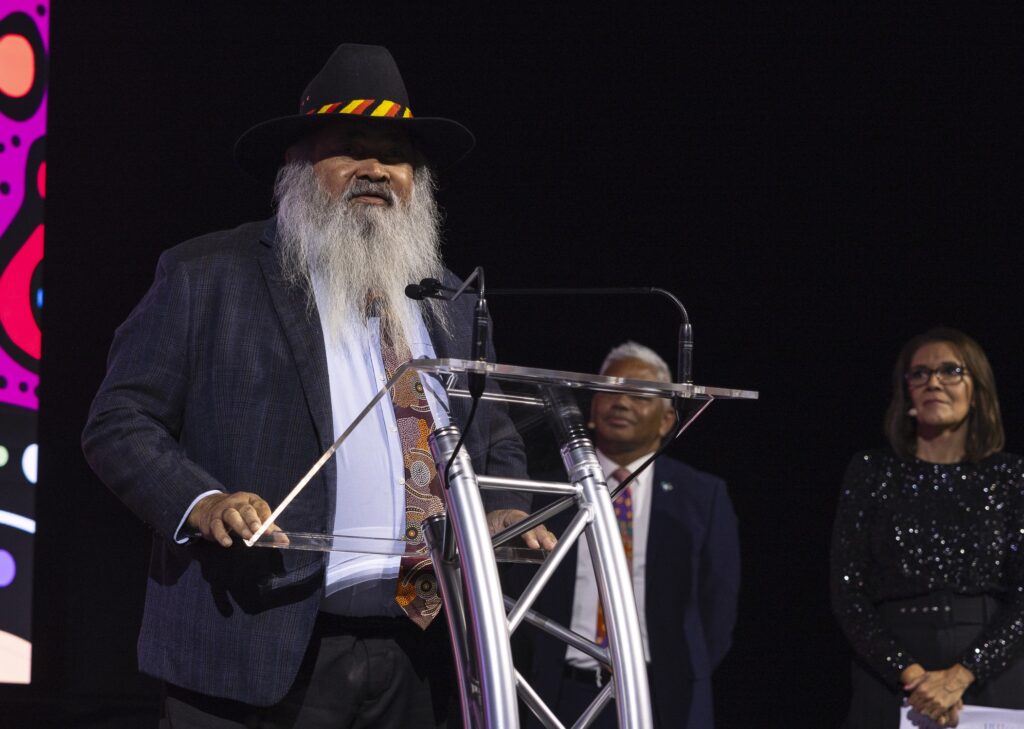
Aboriginal and Torres Strait Islander Research Leadership Award
Recognises Aboriginal and Torres Strait Islander health research leadership and excellence by an Aboriginal and Torres Strait Islander researcher who has made a significant contribution to the health and wellbeing of Australia’s First Peoples.
Associate Professor Lisa Whop
Lisa Whop is a Wagadagam Gumulgal woman from the Torres Strait Islands, Epidemiologist, Associate Research Director and Senior Fellow at Yardhura Walani – the National Centre for Aboriginal and Torres Strait Islander Wellbeing Research, at the Australian National University. Australia’s leading authority on cervical cancer control for Aboriginal and Torres Strait Islander women, Lisa is a Chief investigator on the Centre for Research Excellence on Targeted Approaches to Improve Cancer Services (TACTICS) for Aboriginal and Torres Strait Islander people, where she-leads the Screening and Prevention stream. She is a Principle Investigator on an ARC Discovery Indigenous grant focused on understanding the modifiable factors that influence uptake and completion of HPV vaccination for Aboriginal and Torres Strait Islander adolescents. Lisa’s national and international leadership in cancer screening and prevention has led to the invitation to inform Lung Cancer screening including the Australian Government Program guidelines and shared decision-making tool for the national Lung Cancer Screening program (due to be launched this July).
Pat Anderson Aboriginal and Torres Strait Islander Researcher Award
Named after internationally respected health leader Pat Anderson AO, this award recognises emerging leadership in Aboriginal and Torres Strait Islander health and wellbeing research both inside and outside of the academy.
Associate Professor Graham Gee (community award)
An Aboriginal Chinese man, born on Larrakia country. Graham is a clinical psychologist and worked at the Victorian Aboriginal Health Service in Naarm for 11 years before taking up a position as Senior Research Fellow in the Intergenerational Health group at Murdoch Children’s Research Institute in 2019. Graham’s clinical and academic work has centred around trauma and healing, making significant contributions to informing policy and practice. Graham leads the Intergenerational Health group’s Aboriginal Health Program and is the Co-Director of the Stronger Futures Centre of Research Excellence – Australia’s first national collaborative centre working with Aboriginal and Torres Strait Islander communities and refugee communities to break intergenerational cycles of trauma and social inequity. Graham also leads the Ngagagagee project, which focuses on the experiences and healing needs of Aboriginal and Torres Strait Islander survivors of child sexual abuse in Victoria. Graham was a founding board member of the national Aboriginal and Torres Strait Islander Healing Foundation and also helped establish the Australian Indigenous Psychologists’ Association.
Dr Ali Drummond (academic award)
Ali was born and raised on Weibene (Thursday Island) in north Queensland, and his people are the Meriam (miri-yarm) and Erubam (e-rub) people of Zenadh Kes and the Wuthathi people of Cape York Peninsula. A registered nurse, Ali was a Director of Lowitja Institute for close to a decade before being appointed as the Chief Executive Officer of the Congress of Aboriginal and Torres Strait Islander Nurses and Midwives (CATSINaM), Australia’s peak body for Aboriginal and Torres Strait Islander nurses and midwives. At CATSINAM Ali Co-Leads a Lowitja Institute-funded research project titled ‘The Ume Project: Telling the story of the Torres Model of Care’.
Aboriginal and Torres Strait Islander Student Award
Recognises an Aboriginal or Torres Strait Islander student who has, or is, finishing their studies with a Masters (by research) or PhD postgraduate degree within the nominated timeframe.
Mr Stephen Harfield
Stephen is a Narungga and Ngarrindjeri man from South Australia, a PhD candidate and Senior Research Fellow with the University of Queensland Poche Centre for Indigenous Health. As an epidemiologist and public health researcher, he has worked with Aboriginal communities and organisations across Australia. Stephen received a Lowitja Institute Higher Degree by Research Scholarship and recently submitted his PhD thesis titled ‘Strengthening primary health care for Aboriginal and Torres Strait Islander adolescents living in urban settings’.
Tarrn-doon-nonin Aboriginal and Torres Strait Islander Health Research Project Award
Tarrn-doon-nonin is the Woiwurrung term meaning ‘trust’. This award recognises a research project in Aboriginal and Torres Strait Islander health and wellbeing that has conducted their research to an exemplary standard in line with Aboriginal and Torres Strait Islander ethical principles and practices.
Marninwarntikura Women’s Resource Centre
Marninwarntikura Women’s Resource Centre (MWRC) provides families a place for inspiration, positive change and leadership. The centre supports Fitzroy Valley families by providing mentoring, advocacy, and access to culturally responsive services. The centre received a Lowitja Institute research grant to implement The Bigiswun Kid Project that aimed to identify adolescents’ needs and build knowledge to inform services to improve the health and wellbeing of young people in remote Aboriginal communities. The study findings supported local services to secure additional government funding to establish and implement a place-based social and emotional wellbeing service for young Aboriginal people in the Fitzroy Valley.
Conference website: www.lowitjaconference.org.au
